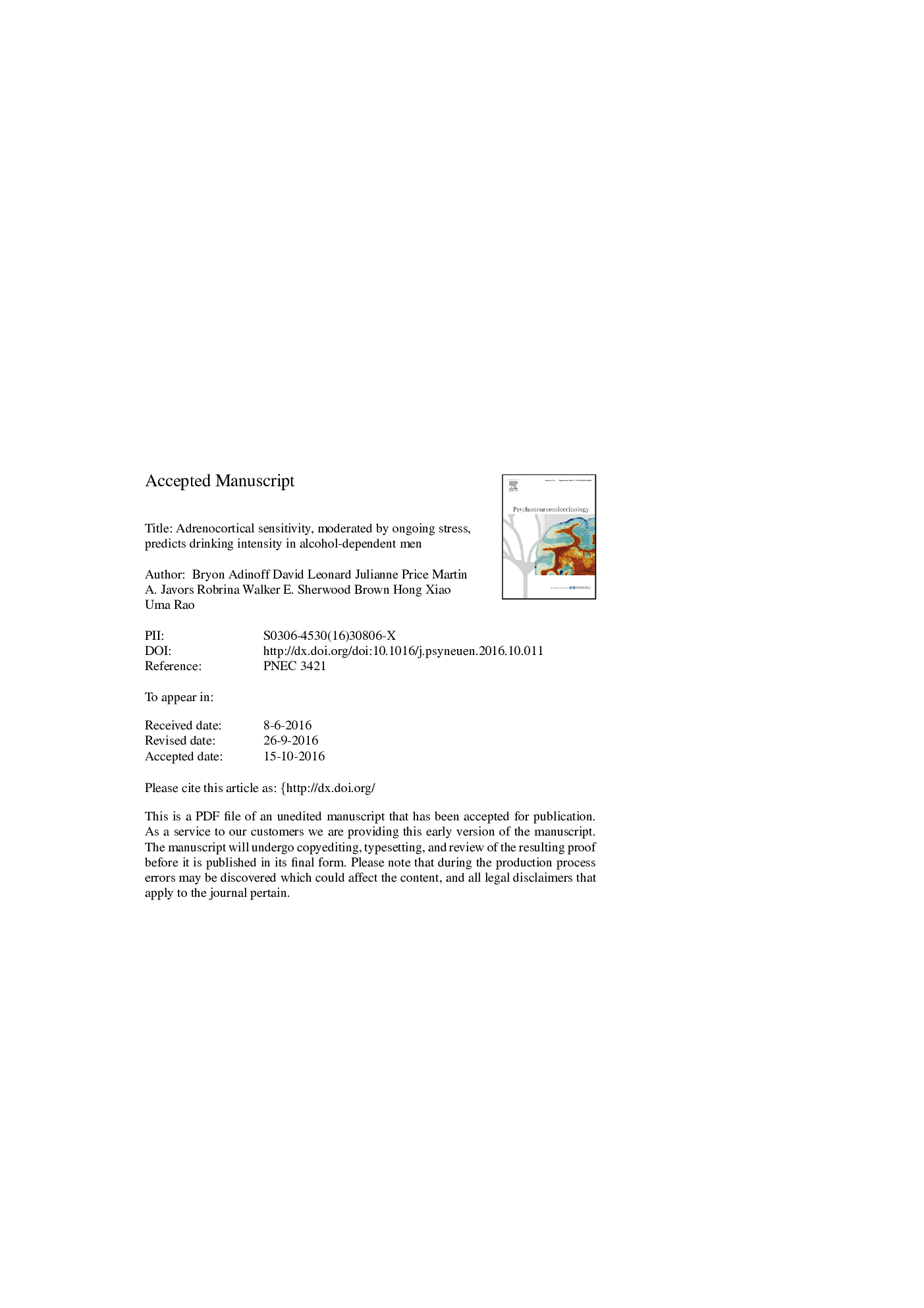| کد مقاله | کد نشریه | سال انتشار | مقاله انگلیسی | نسخه تمام متن |
|---|---|---|---|---|
| 4934581 | 1433967 | 2017 | 41 صفحه PDF | دانلود رایگان |
عنوان انگلیسی مقاله ISI
Adrenocortical sensitivity, moderated by ongoing stress, predicts drinking intensity in alcohol-dependent men
ترجمه فارسی عنوان
حساسیت قارچی ناشی از استرس مداوم، شدت نوشیدن را در مردان وابسته به الکل پیش بینی می کند
دانلود مقاله + سفارش ترجمه
دانلود مقاله ISI انگلیسی
رایگان برای ایرانیان
کلمات کلیدی
موضوعات مرتبط
علوم زیستی و بیوفناوری
بیوشیمی، ژنتیک و زیست شناسی مولکولی
علوم غدد
چکیده انگلیسی
Allostatic load from both environmental stressors and persistent glucocorticoid secretion has been associated with disease severity in alcohol dependence. Heightened relapse risk and/or drinking severity, in particular, may be a reaction to alcohol- and withdrawal-induced changes in physiological stress response systems coupled with ongoing life stress, although their shared contributions upon drinking severity have not been assessed. To investigate the combined contribution of hypothalamic-pituitary-adrenal (HPA) reactivity and environmental stressors (e.g., ongoing life stress) to relapse severity in alcohol-dependent men following treatment, plasma adrenocorticotropin (ACTH) and cortisol were obtained in 4-6 weeks abstinent alcohol-dependent men (n = 41) following a psychosocial stressor [the Trier Social Stress Test (TSST)] and two pharmacological provocations [ovine corticotropin releasing factor (oCRH) and cosyntropin]. Following treatment discharge, drinking outcomes (primary outcome: drinks per drinking day (DDD); secondary outcomes: total drinks and drinking days) were assessed weekly and ongoing life stress was assessed biweekly for 24 weeks following treatment discharge. Generalized estimating equation models of drinking severity were fit with basal and stimulated ACTH and cortisol concentrations as predictors and ongoing life stress as the moderator. Greater levels of life stress were independently associated with greater drinking intensity (DDD and total drinks) but not frequency (days drinking). Higher basal cortisol:ACTH or provoked cortisol:ACTH ratios were strongly associated with greater post-treatment DDD in individuals who experienced higher levels of ongoing stress. In conclusion, ongoing life stress is associated with post-treatment drinking intensity in alcohol dependent men; stress also strengthens the relationship between adrenocortical sensitivity and post-treatment drinking. Physiological measures of allostatic load and environmental stressors conjointly increase relapse intensity.
ناشر
Database: Elsevier - ScienceDirect (ساینس دایرکت)
Journal: Psychoneuroendocrinology - Volume 76, February 2017, Pages 67-76
Journal: Psychoneuroendocrinology - Volume 76, February 2017, Pages 67-76
نویسندگان
Bryon Adinoff, David Leonard, Julianne Price, Martin A. Javors, Robrina Walker, E. Sherwood Brown, Hong Xiao, Uma Rao,
